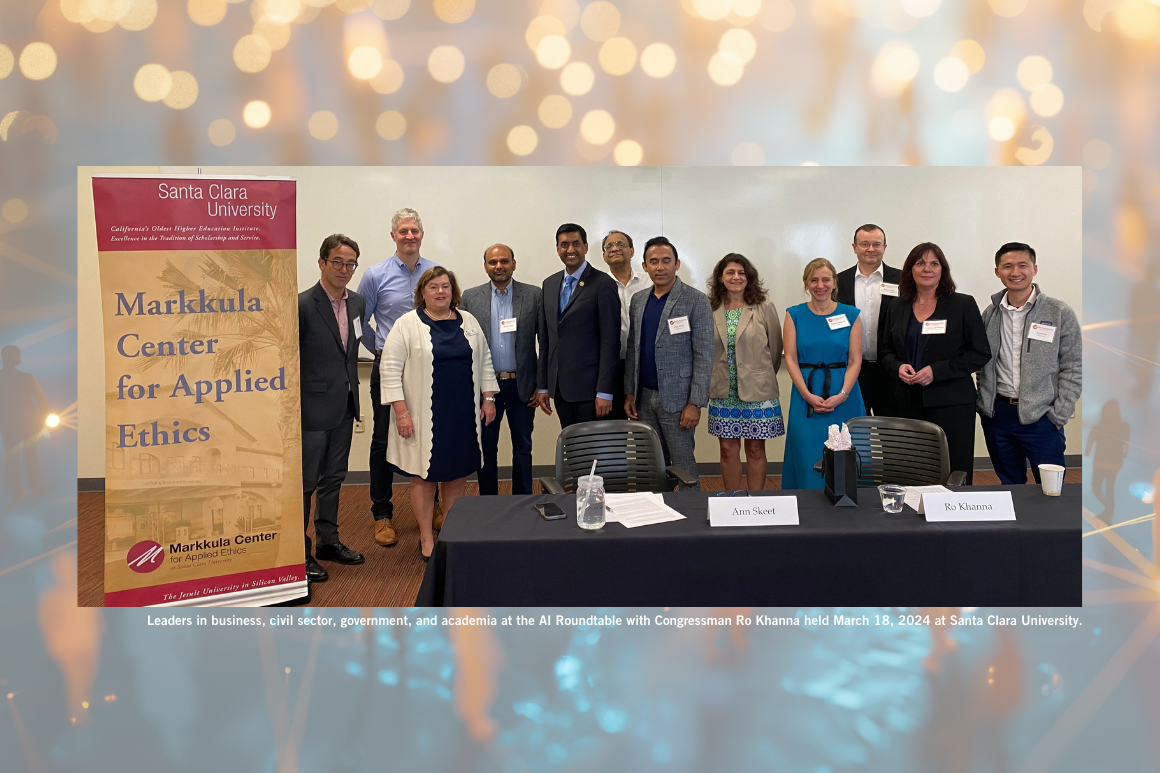A Leadership Community

Leadership takes many forms, and one of those is as a community–an influential community of leaders drawn together to guide others through challenges and to success. The Markkula Center, its Institute for Technology, Ethics, and Culture, and the Santa Clara School of Law, hosted a roundtable discussion in March 2024, with Congressman Ro Khanna, whose district includes Silicon Valley, and a group of leaders from industry, civil society, and academia. Congressman Khanna wanted to hear from leaders in his district to inform his thinking about the regulation of artificial intelligence (AI). Ann Skeet, senior director of leadership ethics at the Markkula Center, moderated the discussion.
Opinions were as diverse as the group bringing them forward. It was observed that many of the participants are used to speaking so frequently with those in their own field that the chance to connect with those in other areas reveals sharp differences in perspective. Several participants felt, for example, that deepfakes are not something to be too concerned about since they are easily identifiable, whereas others felt there are still many people who struggle to identify them.
Where opinion was the most consistent across sectors represented was around the impact to jobs. Several participants felt the number of jobs was going to decline within the next decade, but beyond that, opinions varied. Some felt that job losses may not materialize as soon or as significantly as some people have warned. However, participants believe AI will change the nature of jobs.
One person observed that there is no such thing as trustworthy AI without trustworthy data, and others agreed with this point as a means of advocating for a national privacy law. But this did not mean there was unanimity of a point of view around whether or not AI regulation should happen at the federal or state level. Industry participants observed, and others acknowledged, the challenges of doing business in states with a patchwork of laws. As a result, they were more interested in federal solutions. But there was also a perspective shared by several people that a federal privacy law should not prevent states from enacting greater protections, valuing the ability to develop laws at the state level that are driven by local perspectives and allow for flexibility.

In addition to legislation, several advocated for changes to education. Students are concerned about AI taking their future jobs or impacting them in other ways. Several felt one way to address this was by teaching AI literacy in schools while others advocated for not just how to use AI, but also how to use it ethically. One person suggested teaching ethics in schools as early as middle and high school.
Geopolitically, several commented on the AI race that nations are in with one another for AI supremacy. There was one ominous observation that as employment declines due to AI, humans might be seen as more of a liability than an asset by some governments. Another point made with global implications was the high use of energy and water by AI systems.
The conversation at the roundtable, and the prepared statements each participant opened the session with, served as a resource for the Congressman in his work developing and advocating for regulation. He indicated he would be taking the information with him back to D.C. to apply as future legislation is developed. He expressed his gratitude for the perspectives that were shared by the participants and to the Markkula Center and the School of Law for convening the group.
